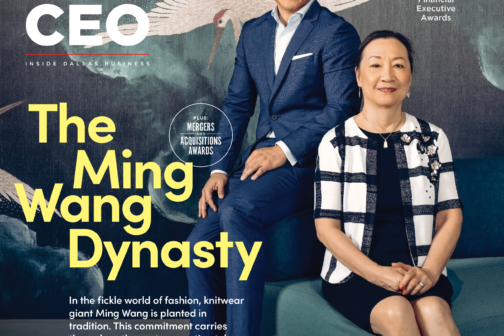Roughly five months into a global pandemic, I became the go-to leader for more than 400 people. Was it a daunting task? You bet. But not for the reasons you may think.
The logistics were certainly challenging. As I’m sure you can relate, I had to figure out the best way to manage via Teams and Zoom. But it wasn’t the details of virtual life that captured most of my focus; it was the people. As the office managing partner for Grant Thornton LLP’s Dallas office, I was now working alongside hundreds of hardworking colleagues, many of whom are parents.

How was this pandemic affecting them, and how could I help?
I won’t lie to you: Being a leader during a crisis like this been the greatest challenge of my career thus far. And like many people, you may be struggling to picture what leadership–let alone work–look like in the future. In fact, according to a recent poll from the American Psychological Association, nearly half of U.S. adults said the pandemic has made planning for their future feel impossible. But I think I have something to offer.
Here are some tips I believe will help you and your organization thrive in the new year and beyond.
Be intentional about building relationships.
Anyone who knows me—especially my colleagues—will tell you that I love a great conversation. But the days of the water cooler were long-gone even before Teams and Zoom became the norm. That is why it is so crucial to initiate meaningful conversations and build relationships with your team members. These can happen virtually, or if you feel safe, you can connect in person for a chat and a cup of coffee. The important thing is that you connect with your team and colleagues outside of meetings. Your intentionality will remind your colleagues that you care about them as so much more than employees, and trust me: they need that reminder right now.
Cultivate community throughout your organization.
Nowadays—especially if your organization has gone hybrid or remote—most of your professional interactions are likely limited to your direct team. This is particularly dangerous for executives and managers who may not get much facetime with people who don’t report to them. It’s imperative to reach out to people outside your immediate team, whether through a 15-minute chat with a newer employee or a lunch break with a teammate from a different department. Consider this: If you have a holiday party or other function coming up, create a game where two wildly different teams must work together. Then, encourage those teams to meet regularly and keep learning from one another.
Think about the future challenges your people will face—and how you will tackle them.
Ask yourself, “what motivates my colleagues?”. What do they want to accomplish, and what roadblocks might get in their way? Because truly effective leadership is not about what you accomplish; it’s about what your people achieve. Putting yourself in your people’s shoes also means having a game plan for those roadblocks. For instance, it’s no secret that the last two years have taken a sizable toll on our country’s mental health. As you engage in the community-building described above, ask your people questions like, “What support do you need that you are not getting right now?” Sometimes all they may need is a little extra flexibility to manage their home responsibilities, and other times they’ll ask for things you cannot directly give them. That’s OK, because you can be the connector: the leader who helps them find answers while reminding them that you are in their corner.
Carve out time to be still.
For years, research studies have illuminated an uncomfortable pattern: People are afraid to ask for time off work. Therefore, it’s so important for us as leaders to both encourage time off and model that behavior ourselves. But even if you are truly too busy to step away from the office right now, you should still carve out time for yourself each day: no meetings, no calls, just you and your thoughts. You can use this time to reflect on a recent challenge you’ve faced, do something that makes you smile, or simply take a break from the cavalcade of calls and virtual meetings you likely engage in every day. Take it from me: There’s power in being still, even if it’s just for a few moments each day.
Ask for what you want.
Until now, all these suggestions have been about what you can do for your people — and rightfully so. But to grow as a leader, you must remain true to your passions. Sometimes that might mean doing something that seems a little scary. I’ve been there. From Hawaii to California to Chicago back to California and now Texas, I’ve moved so many times in my career. Each move was a challenge, but I was confident that I could and would rise to the occasion. This is a reminder to be confident, sure, but more important, it’s a reminder to surround yourself with people who support your goals and ambitions. If you have the skills and a support system like that, why shouldn’t you seek that coveted project or promotion?
The answer, unfortunately, is that some of us have been told that we shouldn’t ask for what we want. Research shows that women ask for promotions less than men, regardless of qualifications. It’s past time to stop that trend. If you’ve been putting off the pursuit of your passions for any reason whatsoever, my advice is simple: go for it. Now, you might be thinking that pursuing a promotion can take you away from the community you’ve worked hard to cultivate. But another tenet of leadership is doing what you think is best for your organization. Plus, as I mentioned above, the best leaders model the actions they hope their employees take. If you pursue your passions wholeheartedly, you are letting your people know that they should, too. And what’s more inspiring than that?
Doreen Griffith is Dallas office managing partner of Grant Thornton.






